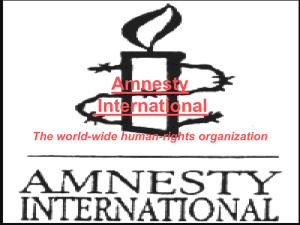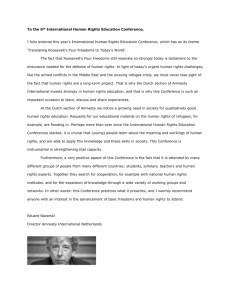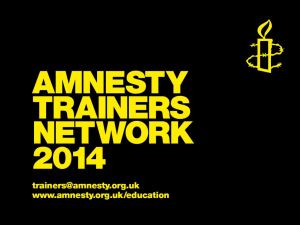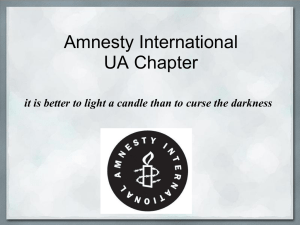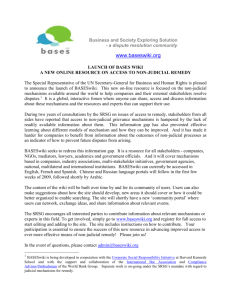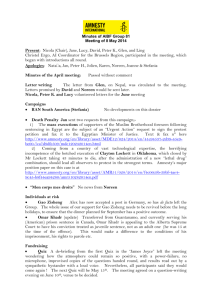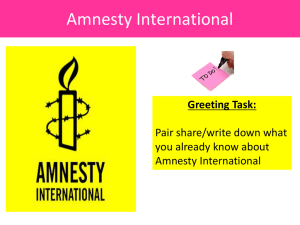Amnesty International has been engaged in work on business and
advertisement
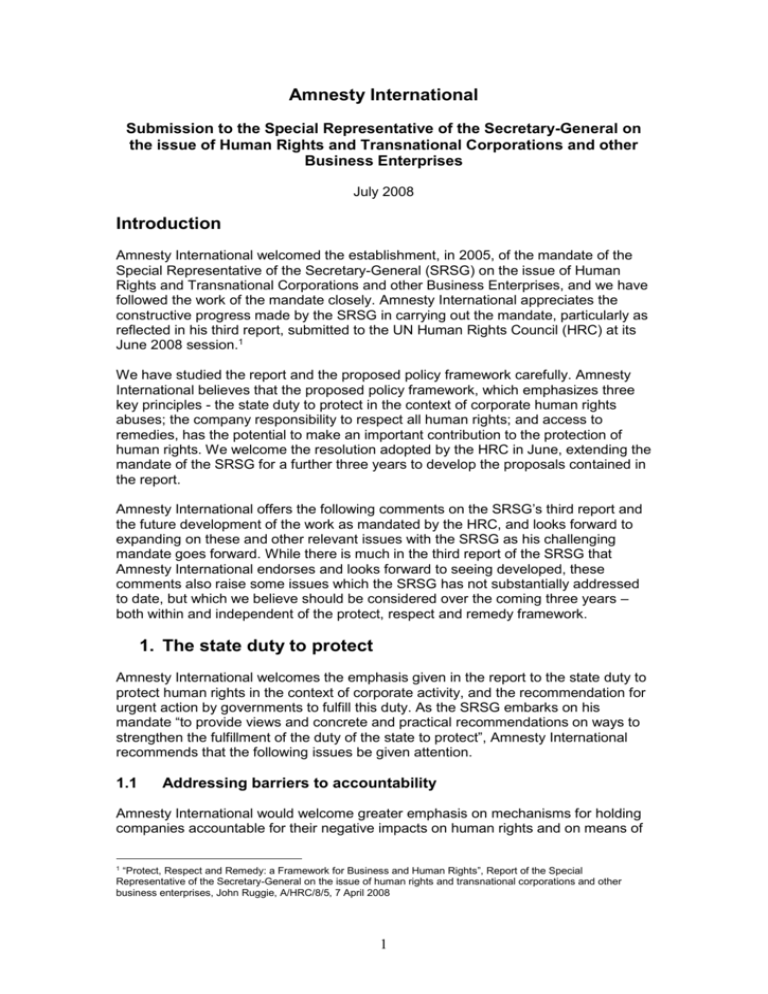
Amnesty International Submission to the Special Representative of the Secretary-General on the issue of Human Rights and Transnational Corporations and other Business Enterprises July 2008 Introduction Amnesty International welcomed the establishment, in 2005, of the mandate of the Special Representative of the Secretary-General (SRSG) on the issue of Human Rights and Transnational Corporations and other Business Enterprises, and we have followed the work of the mandate closely. Amnesty International appreciates the constructive progress made by the SRSG in carrying out the mandate, particularly as reflected in his third report, submitted to the UN Human Rights Council (HRC) at its June 2008 session.1 We have studied the report and the proposed policy framework carefully. Amnesty International believes that the proposed policy framework, which emphasizes three key principles - the state duty to protect in the context of corporate human rights abuses; the company responsibility to respect all human rights; and access to remedies, has the potential to make an important contribution to the protection of human rights. We welcome the resolution adopted by the HRC in June, extending the mandate of the SRSG for a further three years to develop the proposals contained in the report. Amnesty International offers the following comments on the SRSG’s third report and the future development of the work as mandated by the HRC, and looks forward to expanding on these and other relevant issues with the SRSG as his challenging mandate goes forward. While there is much in the third report of the SRSG that Amnesty International endorses and looks forward to seeing developed, these comments also raise some issues which the SRSG has not substantially addressed to date, but which we believe should be considered over the coming three years – both within and independent of the protect, respect and remedy framework. 1. The state duty to protect Amnesty International welcomes the emphasis given in the report to the state duty to protect human rights in the context of corporate activity, and the recommendation for urgent action by governments to fulfill this duty. As the SRSG embarks on his mandate “to provide views and concrete and practical recommendations on ways to strengthen the fulfillment of the duty of the state to protect”, Amnesty International recommends that the following issues be given attention. 1.1 Addressing barriers to accountability Amnesty International would welcome greater emphasis on mechanisms for holding companies accountable for their negative impacts on human rights and on means of “Protect, Respect and Remedy: a Framework for Business and Human Rights”, Report of the Special Representative of the Secretary-General on the issue of human rights and transnational corporations and other business enterprises, John Ruggie, A/HRC/8/5, 7 April 2008 1 1 ensuring that appropriate sanctions are imposed. Such accountability may involve, as appropriate, criminal, civil, or administrative sanction. Effective accountability mechanisms will have to confront the challenges outlined in the report, including those related to company structure and trans-national operations. In respect of concrete and practical recommendations on ways to strengthen the fulfillment of the duty of the state to protect, Amnesty International urges the SRSG to give attention to the following: Effective legal frameworks at the domestic level As the SRSG noted in his second report, ‘[a]t national levels, there is enormous diversity in the scope and content of corporate legal responsibilities regarding human rights’.2 Given that there is such wide diversity, it would be valuable to develop work examining where national legislation and regulation are most effective in managing and addressing the human rights impact of companies, including trans-national corporations (TNCs). Providing specific examples and clear recommendations to states on how they can put in place effective legal frameworks to regulate companies and address abuses involving companies (including by expanding options for access to justice – a point developed below) would be a significant contribution to human rights protection. Linking the state duty to protect and the corporate responsibility to respect Within the context of the state duty to protect some elements of corporate human rights due diligence measures should be mandated by law. This would bring together the company responsibility to respect and the state duty to protect, in a manner that would strengthen both elements of the SRSG’s proposed framework.3 1.2 Extraterritorial dimensions of the state duty to protect The protection of human rights is undermined because both company structure and globalized company operations facilitate corporate evasion of state jurisdiction.4 Amnesty International welcomes the exposition in the report of the obstacles to accountability that are related to corporate structure and the fact that the legal framework regulating TNCs has not kept pace with the realities of globalization.5 This is in contrast to economic law, which is increasingly protecting economic interests beyond individual states’ jurisdictions. The report notes that the “permissible scope of national regulation with extraterritorial effect remains poorly understood.” Amnesty International agrees, and we would welcome greater emphasis on how extraterritorial regulatory and accountability measures can be developed to address this lacuna. For example, clear 2 A/HRC/4/035, para 34. See Allens Arthur Robinson, Brief on Corporations and Human Rights in the Asia Pacific Region (August 2006), http://www.reports-andmaterials.org/Legal-brief-on-Asia-Pacific-for-Ruggie-Aug-2006.pdf, a study of 7 jurisdictions conducted for the SRSG. 3 For example, Environmental Impact Assessments are legal requirements in many countries and Human Rights Impact Assessments (HRIA) could also be mandated by law for certain corporate activities, along with criteria for credibility of a HRIA, and requirements for participation by affected communities and individuals in, and transparency of, the process. 4 Evasion of responsibility and accountability – whether deliberate or not – has been facilitated by corporate structure, issues of corporate form and/or dissolution of the company (e.g. the local entity is a shell company or the company no longer exists as a legal entity and therefore cannot be the subject of legal proceedings), merger or acquisition of the company and/or substantial parts of its assets and sub-contracting. 5 A/HRC/8/5, paras 13 – 14. 2 recommendations and benchmarks for action by states in respect of state support to trade and investment are needed (Amnesty International would endorse the SRSG’s suggestion that Export Credit Agencies should require clients to perform adequate due diligence in relation to their potential human rights impacts). Amnesty International would also recommend that some measures to improve policy coherence should be underpinned by domestic legislation – for example, making it mandatory for state investment support mechanisms to ensure appropriate due diligence and monitoring in relation to the human rights impacts of investment projects. It would be important that appropriate sanctions are built into such systems. Amnesty International is skeptical of the arguments of groups that oppose extraterritorial regulation of companies on the one hand, while fully supporting the development of international law and enforcement mechanisms in the areas of trade and investment on the other. As noted in the SRSG’s report, authoritative sources, such as the UN Treaty Bodies, are increasingly encouraging states to give effect to the duty to protect beyond their borders in certain circumstances6, including in relation to the actions of companies. Amnesty International strongly encourages the SRSG to build on these recommendations, which Amnesty International views as critical to “adapting the human rights regime to provide more effective protection to individuals and communities against corporate-related human rights harm.”7 The state duty to protect in the context of TNCs and globalization requires much greater cooperation between states.8 Sharing of information and technical and financial resources are all useful actions9, but states should also be encouraged to look at cooperation in terms of accountability and enforcement mechanisms.10 There are some useful models for international cooperation, including in the areas of corruption, illegal drugs and trade in specific commodities. There may also be lessons to be learned from developments in international economic law, which increasingly depends upon international legal agreements and supra-national enforcement mechanisms. At the international level Amnesty International would also encourage the SRSG to examine the role of the International Financial Institutions and the human rights responsibilities of these institutions and their member states. 1.3 Conflict zones The challenges relating to companies operating in conflict zones are addressed in the report. Amnesty International agrees that home states could assist companies in addressing the heightened risk of human rights violations in conflict zones. However, this assumes a company has the will to proactively address such risks and to operate in a manner consistent with international human rights and humanitarian law. It is at least as important to hold to account those companies that willfully exploit - and often as a consequence exacerbate – conflicts. In many of the resource-driven conflicts of Africa for example, companies have been actors seeking benefit and even supplying arms in return for preferential access to resources. Security Council sanctions For example, see General Comment 14 (Right to Health), para 39: “To comply with their international obligations ... States parties have to ... prevent third parties from violating the right in other countries, if they are able to influence these third parties by way of legal or political means, in accordance with the Charter of the United Nations and applicable international law. " 7 A/HRC/8/5, para 1. 8 For example, the state in which the harm occurred should be able to request the assistance of the state in which the company is headquartered, with an expectation that such help would be forthcoming if certain basic conditions in terms of credibility of the allegation were met. 9 A/HRC/8/5, paras 43 – 45. 10 While the OECD Guidelines represent international cooperation, the Guidelines and associated National Contact Points do not provide meaningful mechanisms for enforcement or accountability. 6 3 notwithstanding, the level of impunity enjoyed by such actors remains a major threat to the protection of human rights in conflict. Amnesty International would also encourage the SRSG to look at the role played by private military security contractors (PMSCs), both in the context of conflict-affected areas and beyond. The role played by these companies, and the fact that they have, in several cases, been contracted by states, raise specific accountability issues. It is important to underline that the State cannot “contract out” of its human rights responsibilities by engaging a private actor to carry out security functions. In the context of Iraq and Afghanistan we have seen not only attempts by the contracting state to avoid its human rights obligations, but efforts by PMSC home states to guarantee impunity for PMSCs operating aboard. In such cases both the home and host states are failing in their duty to protect. The use of PMSCs by other private actors (often other companies, such as those in the extractive sector) also raises important accountability issues. While PMSCs and the violations that have been associated with their operations offer a stark case study on the issues associated with privatization of state functions and human rights responsibilities of different actors, many of the issues are also relevant to the privatization of other traditional state functions which have direct impacts on human rights (such as the privatization of water supply, health care or prison services). In these cases the responsibilities of the state and the corporation should be made explicit in order to avoid what we have already seen – the attempted obfuscation of responsibility by all actors, complicated by jurisdictional factors. 2. The company responsibility to respect Amnesty International welcomes the SRSG’s confirmation of the corporate responsibility to respect all human rights as a baseline, and the corresponding need for concrete action by companies to discharge this responsibility. We also agree that the responsibility to respect is not just a passive or reactive process, but frequently requires concrete, proactive measures. Moreover, in specific circumstances companies may also have responsibilities in relation to the protection, fulfillment and promotion of human rights.11 An important component of the renewed mandate of the SRSG is “to elaborate further on the scope and content of the corporate responsibility to respect all human rights and to provide concrete guidance to business and enterprises.” Recommendations on what constitutes effective due diligence for companies have the potential to make a valuable contribution to the protection of human rights. Amnesty International would welcome the development of guidance and benchmarks in relation to critical elements of human rights due diligence, such as Human Rights Impact Assessments. We would also emphasize the importance of independent monitoring and assurance of corporate due diligence measures. This can take many forms, but is essential to building confidence and trust and enabling companies to learn and to address dilemmas. Amnesty International also agrees with the SRSG that human rights policy is too often isolated within companies and that much more needs to be done to ensure that policy is integrated across company operations. 11 There is a range of contexts where wider responsibilities are engaged. For example, Amnesty International would call attention to standards such as the Voluntary Principles on Security and Human Rights or emerging standards in respect of Information and Communication Technology companies that require companies to act to protect rights. 4 Due diligence is primarily a tool for the willing. Other measures are also needed to address those companies that are simply not interested in ensuring their operations respect human rights. 3. Access to remedies Amnesty International concurs with the SRSG on the importance of access to remedies. We welcome the HRC resolution’s emphasis on both judicial and nonjudicial mechanisms, which asks the SRSG “to explore options and make recommendations for enhancing access to effective remedies available to those whose human rights are impacted by corporate activities.” 3.1 Judicial Mechanisms Amnesty International welcomes the recommendation that states should strengthen judicial capacity to hear complaints and enforce remedies. Ensuring that national justice systems can more easily and effectively address abuses that occur within the state is critical. This should include reform of the national legal framework where necessary. For example, states should be encouraged to make the legislative changes necessary to enable “class action” or other collective suits to be brought within their jurisdictions. The report notes that there remain significant obstacles to seeking remedy outside the state where the harm occurred and that law is slowly evolving to address some of these obstacles. Amnesty International would welcome further recommendations to states on how law and international cooperation can evolve and remove obstacles to access to justice. Law can evolve faster if clear guidance is given on the type of legal and policy changes that are needed. 3.2 Non-judicial Mechanisms Amnesty International supports the recommendation that non-judicial mechanisms to address alleged breaches of human rights should conform to certain principles in order to be credible and effective. Amnesty International would add to those criteria listed by the SRSG that non-judicial mechanisms should also have sufficient capacity and resources to carry out their function effectively. State-based non-judicial mechanisms should also be given sufficient authority to ensure they can be effective. State-based non-judicial processes frequently lack both resources and the necessary powers to be effective, especially when confronting powerful non-state actors. For example, few can compel testimony or have the legal powers necessary to carry out proper investigations (for example, powers of search and seizure). In respect of human rights violations and abuses, all persons have a legal right to an effective remedy. While recognizing that non-judicial mechanisms can have a role to play, “soft mechanisms” such as OECD national contact points (NCPs) and grievance mechanisms voluntarily established by companies have inherent limitations that Amnesty International believes should be more clearly articulated. It is important that non-judicial mechanisms should not be used as a pretext by governments to ignore their obligations to provide an effective remedy, nor used by companies to avoid appropriate regulatory actions. They must not be seen as a substitute for judicial mechanisms. However, as the SRSG noted in both his second 5 and third reports12, states tend to address the human rights impacts of companies within the confines of relatively weak institutional frameworks or voluntary initiatives like the Global Compact. Amnesty International is concerned that both states and companies use such mechanisms to deflect calls for initiatives that could advance corporate accountability and access to justice. Amnesty International welcomes the attention given by the SRSG to the potential of National Human Rights Institutions (NHRIs). However, in those countries where they may be most needed, NHRIs often do not have the power or resources to deal with allegations of abuse or complicity involving companies. Clear recommendations for strengthening NHRIs would be welcome. A network of NHRIs working together on corporate accountability could be one means of addressing trans-national elements of access to justice and accountability, but to be effective this would require a framework for cooperation. 4. Conclusion As noted above, Amnesty International believes that the policy framework proposed by the SRSG offers an opportunity to take forward a number of critical issues. Within these comments we have emphasized the need for greater attention to accountability, including appropriate sanctions, and the need for legal change to underpin and cement protection of human rights in certain circumstances. Amnesty International welcomes the report’s recognition of the need for companies to be held to account and fully concurs with the statement that “State regulation proscribing certain corporate conduct will have little impact without accompanying mechanisms to investigate, punish, and redress abuses.”13 However, the discussion of the framework within the report places emphasis on preventive action and on providing tools and other support to companies that are basically willing to respect human rights, as well as access to remedy. All, of course, are of critical importance and Amnesty International fully endorses robust preventive action and corporate due diligence measures. However, while many companies are implicated in human rights abuses and violations because of the lack of appropriate tools and/or frameworks, some companies are implicated in human rights abuses and violations because of their deliberate or negligent actions and inactions, and because they believe they can act with impunity. It is important that both contexts are adequately addressed. Impunity for past abuses can and does fuel future violations and abuses of human rights. Finally, Amnesty International believes that some supra-national institutional structure such as an Ombudsman, mentioned in the report of the SRSG, should be seriously explored. We look forward to working with the SRSG on his continuing mandate. Ends/ 12 13 A/HRC/4/035, para 17 and A/HRC/8/5, para 22. A/HRC/8/5, Para 82 6
